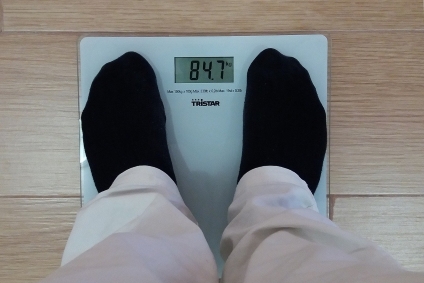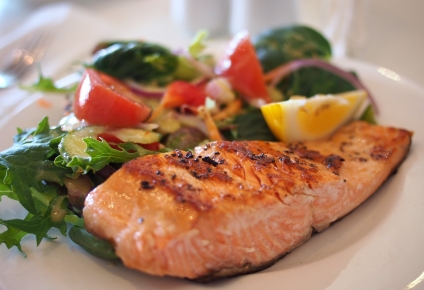Weight Loss Through Mindfulness: The Science Confirms It

“Greater in battle than the man who would conquer a thousand-thousand men, is he who would conquer just one—himself.” ~ Buddha
According to researchers at Brown University School of Public Health, the reason many of us are overweight has more to do with our mind than our body. We make choices on what to eat based on deeply engrained habits, habits about how food makes us feel, instead of what it does to our body. So the mistake most people make when it comes to weight loss is to simply approach the problem from the perspective of the body, and ignore the role of the mind.
We all like to eat food we enjoy, including those of us who are health conscious. There is nothing wrong with wanting to eat a nice meal that makes us feel satisfied. The problem arises when we have emotional issues that we haven’t resolved, most likely because we don’t know how, or feel powerless to resolve them. And for many people, eating is a way of temporarily alleviating some of the uncomfortable emotions associated with them.
What many people who overeat don’t fully realize is that there are consequences of years of unhealthy eating and lack of exercise, and maybe some don’t even want to know. But those consequences will always catch up with them. When they reach middle age or older, they begin to experience health problems such as knee and back pain, diabetes, heart disease, stroke, and even cancer. And when they reach that stage, no amount of food can cover up all the pain and suffering from an ailing body.
So if you want to lose weight and keep it off, then you need address the mental and emotional issues driving your eating habits. This is where the mindfulness practice can help.
The Science behind Mindfulness and Weight Loss
A growing body of research has found that mindfulness helps people lose weight and keep it off. Researchers at North Carolina State University have evaluated several peer-reviewed studies that show a direct link between mindfulness and weight loss. And 4 out of the 5 studies that followed up months later found that research participants were able to keep the weight off.
In another systematic review, researchers also found the link between mindfulness and weight loss in 13 out of 19 studies. The reasons for some of them not showing a link are likely due to methodology of the studies, such as the nature of the mindfulness intervention.[1]
According to Judson A. Brewer, psychiatrist and director of research and innovation at the Mindfulness Center at the Brown University School of Public Health, the reason mindfulness helps people lose weight is that overeating has more to do with the brain than the body. As he explains it, the cause of the extra pounds is eating based on emotions. Those who are overweight tend to eat when they feel stressed, lonely, or bored, and over time, they create deeply entrenched habits.
One mechanism by which mindfulness works is that the practice helps build the prefrontal cortex of the brain, which is responsible for willpower to say no to unhealthy foods. In addition, mindfulness helps us understand the reasons for our eating behavior, and gives us the strength to address those reasons. These two mechanisms are essential for changing old eating habits. [2]
“To change your body you must first change your mind.” ~ Toni Sorenson
How Mindfulness Can Help You Lose Weight
The mindfulness practice is about training yourself to be in the present moment, to observe what you are doing, and what is happening in your body and mind. There are several ways mindfulness can help you lose weight. Here are some:
Clarity to make better choices. Part of the mindfulness practice entails calming your mind, which enables you to see things more clearly, instead of working so hard to figure them out. So by seeing things more clearly, you will make better choices.
Greater self-control. By calming your mind, you will also calm your emotions, which will lead to greater self-control. This is essential when you’re trying to change deeply engrained habits. And once you change those habits, you’ll develop greater self-confidence and self-esteem.
Address your stress. The other effect that calming your emotions will have is make you more resilient to stress, which for many people is a cause of overeating. You’ll feel more relaxed, and won’t be triggered by people or situations that caused you stress before.
Overcome emotional issues. Many of us have emotional issues that we’ve been carrying for a long time that can cause us to overeat. We continue carrying them because we haven’t yet figured out how to resolve them. The mindfulness practice helps us gain a deeper understanding of those issues, and gives us the inner strength to heal and transform them. Now, this takes a little more time and work with the practice, but you can overcome these issues if you’re willing to put in the effort.
The Key to Weight Loss
Here’s a scenario that happens all to often: People start a weight loss program by exercising and eating healthy. They get all excited about living a healthier lifestyle, and follow their new program religiously. After a few weeks, they realize they’re not losing weight, but actually gaining more weight. Discouraged, they end up quitting their weight loss program altogether, and now they’re heavier than before. Has this ever happened to you?
So, where did they go wrong? They overlooked the most important principle of weight loss: Consistently burn more calories than you consume.
When you start working out, your body will start building muscle mass, which is actually good. However, exercising also increases your appetite, so there’s a tendency to eat more. Even though you’re eating healthier food, it’s still more calories. And since muscle weighs more than fat, you end up gaining weight.
Now, don’t worry if you initially gain some weight from exercising. The added muscle mass can work in your favor. While muscle weighs more than fat, it also requires more calories to build and maintain. That’s why you get hungrier. But with more muscle mass, you’ll burn more calories than before, which is great.
So if you want to lose weight by exercising and eating healthy, then you need to pay close attention to not just what you eat, but also how much you eat. You have to consistently consume fewer calories than what your body requires. This means eating smaller portions and allowing yourself to be hungry before you eat your next meal. But this doesn’t mean starving yourself because that will backfire, and you’ll just end up gaining weight.
THE KEY TO WEIGHT LOSS: Consistently burn more calories than you consume.
It’s important to eat all your regular meals, and a couple of healthy snacks. But instead of eating immediately when you get hungry, wait about 30 minutes to an hour to allow your body to burn the stored energy, i.e. body fat. This is how you lose the weight.
What I would suggest is cut your calories by cutting fats and carbohydrates, and increasing your protein intake. You will need more protein to help build the muscle mass.
If you really want to get into exercising, I recommend a combination of weight training and some form of aerobic exercise, such as walking, bike riding, or stair climbing. This will help you build muscle, and speed up your metabolism, so you’ll burn calories faster.
There are a lot of good books out there that explain this process in greater detail. I suggest getting one to help you learn more, and to stay motivated.
“Weight loss is not impossible. Weight loss is hard, but hard is not the same as impossible.” ~ Unknown
How to Practice Mindfulness to Lose Weight
So now that we understand how mindfulness can help us lose weight, the question becomes: How do we apply the practice? There are three main ways: 1) Mindful eating, 2) mindful exercising, and 3) the mindfulness practice.
Mindful Eating
As I mentioned above, mindfulness is about awareness of what is happening in the present moment in our body and mind. Most of us don’t think about observing ourselves. We know how to observe other people, but not ourselves. So now we’re going to observe our thoughts, emotions, and behavior like an outside observer. This takes a little separation from our ego, i.e. our sense of self. Here’s how we can practice mindful eating:
Identify your eating habits. The whole process of mindful eating begins with identifying your current eating habits. For a few days, keep a log of when, where, and what you eat. Then review it to try and identify any patterns, such as stopping by a favorite fast food restaurant on the way home from work, or rewarding yourself with a heavy meal after a busy work week.
Identify the emotions associated with eating. Next, if you’re eating something besides your regular healthy meals, what emotions are you feeling? Are you bored, restless, stressed, or lonely? Maybe you’re feeling guilty for eating something you know isn’t healthy for you. Make it a habit to pay attention to your emotions. If you keep running from them, or covering them up, you will remain stuck in the same unhealthy patterns.
Here are some more tips to help you eat mindfully[3]:
1) Eliminate distractions. One reason we overeat is that we’re usually distracted by other activities during our meals, such as work, watching television, texting, or engaged in conversation. If you want to eat mindfully, avoid any distractions and give all your attention to your eating.
2) Slow down your eating. Another reason we overeat is that we eat too fast. It takes about 20 minutes for your brain to receive the signal from your stomach that you are full. So if you’re inhaling your food in about 5-10 minutes, then you won’t know when to stop, and you’ll keep eating past the point of when you’re full.
3) Drink water before your meal. Drinking water before a meal will interrupt your eating patterns, and force you to be in the present moment and be more mindful. Drinking water has the added effect of filling some of the space in your stomach, so you’ll feel full with fewer calories. Furthermore, drinking water helps you stay hydrated, which will improve your mental focus.

4) Experience the food. Eating a healthy and delicious meal can be a joyful experience, instead of a tool for covering up emotions. Take time to enjoy your food. Notice the different sensations, such as smell, taste, and appearance of your food. By taking more time to fully experience your meal, you are bringing yourself back to the present moment, i.e. you are being more mindful. So, savor each bite.
5) Pay attention to your hunger level. Notice if you’re eating because you’re hungry, or for other reasons. This will help you identify emotions associated with eating. As I mentioned above, if you’re trying to lose weight, then you need to allow yourself to be hungry for a while before you eat your next meal. Remember, there is nothing wrong with feeling hungry.
6) Eat regular meals. By exercising and eating regular meals, you keep your metabolism up. That means you’re burning lots of calories, which is what you want when trying to lose weight. If you skip meals, your body goes into survival mode and gets the signal that food is scarce, which causes your metabolism to slow down. And if you later eat a large meal, it will be more calories than your body requires, and it will simply store the extra calories as body fat. This is why starvation diets don’t work.
7) Prepare and serve smaller meals. Ideally, you want to eat 3 regular meals, and couple of small healthy snacks in between. If you do this, you’ll need to eat smaller portions. And when you’re serving yourself, be mindful of how much you’re putting on your plate. Serve yourself the amount of food that will almost get you to the next meal, so you allow yourself to be hungry for a while before eating again. If you serve yourself based on your hunger level, you will end up eating too much.
BONUS TIP: Use smaller plates, and serving and eating utensils. According to a study published in the British Journal of Nutrition, most participants in the study lost weight simply by using smaller tableware. The reasoning is they tricked their mind to serve themselves smaller portions, and take smaller bites.[4]
If you’re serious about practicing mindful eating, you can take it to a whole other level. You can turn your meal into a meditation session. Basically, eat your meal in silence, slow down, pay close attention to your eating experience, and chew each bite thoroughly.
This is how we eat all our meals at our mindfulness retreats: We start out by someone ringing a bell to bring us back to the present moment. Then someone else reads The Five Contemplations, which helps us get focused, contemplate the reasons why we eat, and feel gratitude for all the people who worked to provide us with our food. Then we begin eating slowly and mindfully. Occasionally, someone will ring the bell, and we all stop eating momentarily to enjoy the sound, then we resume eating. All our meals are in silence. It is a very peaceful and enlightening experience.
Mindful Exercising
Many people join a gym and start working out without a clear understanding of how to exercise properly. They go into the gym every day and throw some weights around figuring “I’ll just wing it.” While just about any exercise is better than none, trying to work out like this will yield minimal results, and can also be dangerous.
By not doing the exercises properly, you will not get the full benefit of each exercise. You can also hurt yourself by not stretching, warming up, or by using too much weight.
It is beyond the scope of this article to explain how to perform each exercise properly. There are entire books written on the subject. What I do want to touch on is applying mindfulness to your exercise routine.
Performing the exercises properly. Each exercise has a specific muscle, or group of muscles, that it is intended to work. It’s real easy to perform an exercise and not use the target muscle. Many people will use momentum by using their back and legs to move the weights. The main reasons for this are usually ego, and the desire to show progress.
To do the exercises properly, you have to use strict form and pay close attention (i.e. use mindfulness) to ensure that you’re using the muscle(s) the exercise is meant for. For example, the curling exercise with a barbell or dumbbells is intended to work the biceps. However, many people will use their legs and back to help lift the weight, and use the bicep muscles very little.
“A huge part of losing weight is believing you can do it, and realizing it’s not going to happen overnight.” ~ Unknown
Performing the right amount of exercise. When you first start working out, almost anything you do will yield results. But after a few weeks, the gains will diminish because your body will begin to adapt to the exercise stimulus. So what you have to do in order to keep making gains is gradually increase amount of weight of each exercise, and the intensity. Knowing how much of these is enough, without hurting yourself, takes mindfulness.
Again, there are many books and articles that explain these techniques in detail. I suggest getting a good understanding of weight training. This will help you get the most from your exercise routine and avoid getting hurt, which would derail all your efforts.
The Mindfulness Practice
There are three basic ways to develop mindfulness: 1) Meditation, 2) mindful activities, and 3) writing meditation. Neither of them require a lot of your time, and they can help you tremendously in changing old habits, and improve many other areas of your life.
Mindfulness meditation. By meditating, you train your mind to be more observant. As your thoughts settle down, everything becomes clearer. If you’re new to meditation, begin by sitting quietly for about 5-10 minutes following your breath. Don’t worry if your mind wanders off. That’s perfectly normal. The idea is to keep bringing it back to your breath. With some practice, it’ll become a little easier to stay focused.
For best results, it’s a good idea to meditate regularly, such as every day or every other day. Over time, your mind will settle down more and more, and it will become easier to stick with your weight loss plan.
Mindful activities. Another way to develop mindfulness is to make a conscious effort to be more mindful. We actually already touched on this above with mindful eating. What you do is pick any activity you like, and focus all your attention on it.
For example, you can wash the dishes mindfully. Instead of letting your mind wander off, slow down and pay close attention to all aspects of washing dishes, such as soaking the dishes, applying the soap, and rinsing them. You can also notice the sensory aspects of the activity, such as sight, sound, and physical sensations.
Other activities that are great for practicing mindfulness include walking, folding clothes, and even yard work. Basically, any activity that requires little thought is good for mindfulness training. Then we can apply that mindfulness to activities that require more attention, such as driving or our job duties.
Writing meditation. This is a practice I developed to help you overcome stubborn habits that are preventing you from being at peace. What you do is take the scripted meditation, which is a set of positive affirmations, and copy it by hand over and over. This will imprint the affirmations into your subconscious mind, and they will manifest themselves in your life without any conscious effort. And it only takes about 5-10 minutes a day.
I’ve written a meditation specifically for mindful eating. This will reinforce the healthier habits in your mind, and make it easier for you to achieve your weight loss goals. Click here to download a copy of the exercise.
It’s important to note that you don’t have to become a Buddhist to practice mindfulness. Remember that mindfulness is simply a practice of improving our awareness, and not a religion. This means that people of all different faiths can practice mindfulness without it interfering with their spiritual beliefs. In fact, mindfulness will help them better understand their spiritual faith.
Need help learning mindfulness meditation? Check out Mindfulness Meditation Made Simple: Your Guide to Finding True Inner peace (paperback).
Excuses We Make for Not Losing Weight
We all make excuses for things we don’t want to do, usually because they’ll take us out of our comfort zone. Here are some of the top excuses for not exercising and eating healthier. [5]
“I don’t have time to cook nutritious meals.”
Cooking healthy meals doesn’t take more time, if you do a little planning. You can buy pre-cooked items at the grocery store, such as rotisserie chicken, which is delicious. Frozen vegetables and salad mixes are also time-saving options. And how much time does it take to bake a potato, or make rice in a rice cooker? Very little.
Another option is to cook enough for 2-3 days, have the leftovers the next day, or freeze the meal-size portions. Then on a day when you really are pressed for time, or don’t feel like cooking, just take them out of the freezer and heat them up in the microwave.
I, personally, like to eat well, but without spending a lot of time in the kitchen. So I search on Google for recipes using the terms “quick” and “easy.” I’ve found some great recipes, including one for Chicken Marsala that only takes about 30 minutes to make, and it’s delicious.
“I don’t have time to exercise.”
You don’t need a lot of time to exercise. All you need is about 20-30 minutes a day. If you simply keep track of how you spend your time for a couple of days, you’ll see where you can cut back on non-essential activities, such as watching TV, playing games on the computer or cell phone, texting, emailing, etc.
I recently did an evaluation of how I was spending my time in order to make more time to work on my next book. I managed to find about 20 hours per week by cutting back on some activities, and eliminating unproductive activities. You can do the same and find the time to exercise. It’s a matter of reevaluating your priorities.

You don’t have to join a gym, unless you want to take your exercising to another level. The main thing is to become more active than you are now. With 20-30 minutes you can do some simple exercises like walking, squats, push-ups, or sit-ups. You can even incorporate exercising into your regular routine, such as parking farther away at work or at the store, use the stairs instead of the elevator, or take a short walk during your lunch break.
“Success is what comes after you stop making excuses.” ~ Luis Galarza
“Healthy foods are expensive.”
This is a myth. What is more expensive is eating fast food all the time. You can buy frozen fish fillets, fully cooked shrimp, and chicken at very reasonable prices. You can also find other fully cooked frozen foods that may appeal to you, such as meatballs or stir fries. Other items that are cheap are rice, beans, and pasta. You can also find packages of salad mixes and vegetables at reasonable prices.
I try to buy things when they’re on sale, especially meats and fruits. Some grocery stores post their weekly flyer with specials online. With these options, you’ll probably end up saving money, especially if you begin eating smaller portions.
Another way to save money is to not waste food. Most of us throw away a lot of food. Cooked food spoils before we can eat it all, or we buy things we think we’re going to eat, but we don’t. I’ll bet if you go into your pantry right now, you’ll find something that has expired. This is an area where we can be more mindful. Here’s an article with some great tips to avoid wasting food: “7 ways to reduce food waste in your kitchen.”
“I’m too tired to exercise.”
If you’re too tired, one of the reasons is probably that the foods and quantities you’re eating are making you lethargic. A large heavy meal will make you drowsy, and sugary foods and beverages will give you a brief surge of energy, followed by a dramatic loss of energy. Exercise will actually boost your energy levels, and it will help you sleep better at night, so you’ll be more rested during the day.
Improved sleep is also a benefit of meditation. In fact, meditation is so effective that you’ll feel more rested with fewer hours of sleep. A study published in 2010 in Behavioral and Brain Functions found that people who meditate regularly require about 2.5 fewer hours per night. [6]
“I’m so out of shape,” or “I’m too old.”
It’s never too late to start feeling better. If you start exercising and eating healthier, you’ll see almost immediate improvement in how you feel. You will also extend your life, as you’ll be giving your body the nutrients and exercise it needs to function at its best. In addition, you’ll begin to feel better about yourself, knowing that you’re making positive changes in your life.
And for those of you who are elderly, you probably have the time, but limited mobility. There are options for you, such as special equipment and exercise classes for elderly people. The classes have the added benefit of being a social activity for people who tend to isolate due to their limited mobility. Check with your health insurance company. Most of them provide exercise equipment and classes free of charge, as it’s in their interest to keep you as healthy as possible.
BTW, if you’re having back problems, it could be due to lack of physical activity and stretching. This is common. I incorporate stretching into my meditation routine to keep my back from hurting, and keep other muscular issues under control. Here is a great article about how to keep your back healthy through exercise: “Exercise and Fitness to Help Your Back.” Also ask your doctor about this, as he may have some suggestions.
“The best way to predict your health is to create it.” ~ Unknown
Final Thoughts
The mindfulness practice has been around for over 2,500 years, and it is more popular today than when the Buddha introduced it to the world. Much of the rise in popularity has taken place over the last 20-30 years. This is because researchers have confirmed the many benefits of the practice, such as lower stress, better physical and mental health, better relationships, improved cognitive abilities, and of course, weight loss.
So if you follow the suggestions outlined above, you’ll begin to feel better physically, mentally, and emotionally, and you’ll live a happier and longer life. You’ll feel better about yourself because by changing your old habits, you will have finally conquered your greatest adversary—yourself.
References
[1] Olson, KayLoni L, Emery, Charles F. (2015, January). Mindfulness and weight loss: a systematic review. National Library of Medicine. https://pubmed.ncbi.nlm.nih.gov/25490697/
[2] Stephens, Betsy (2019, November 19). How Mindfulness Helps You Lose Weight. AARP. https://www.aarp.org/health/healthy-living/info-2019/mindfulness-weight-loss.html
[3] Smith, Paige (2022, August 10). 9 Mindfulness Tips to Eat Smart. Beachbody on Demand. https://www.beachbodyondemand.com/blog/9-mindfulness-tips-to-eat-smarter-and-lose-weight
[4] Hauser, Marion A., MS RD, Hauser, Ross A., MD (2017, January 18) Is the key to weight loss using smaller cooking utensils and spoons? The Doctor & the Dietician https://www.hauserdiet.com/health-articles/key-weight-loss-using-smaller-cooking-utensils-spoons/
[5] Kim, Juju (2014, September 5). 10 Bogus Weight-Loss Excuses You Need to Stop Making. Good Housekeeping. https://www.goodhousekeeping.com/health/diet-nutrition/advice/a21859/weight-loss-excuses/
[6] Möllenhoff, Christian (2021, November 26). Can Meditation Reduce the Need for Sleep?. Forceful Tranquility. https://www.forceful-tranquility.com/can-meditation-reduce-the-need-for-sleep/
If you enjoyed this article, sign up below for the Blooming Lotus Newsletter and we’ll notify you when the next article is released:





0 Comments